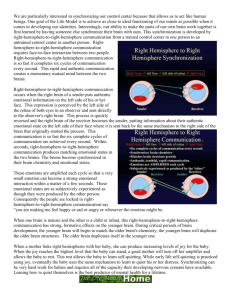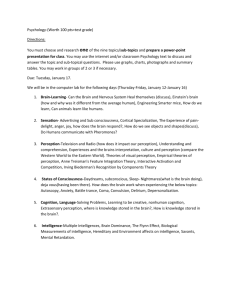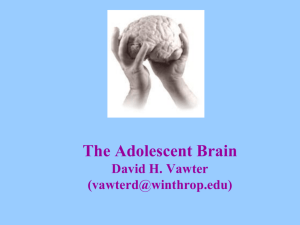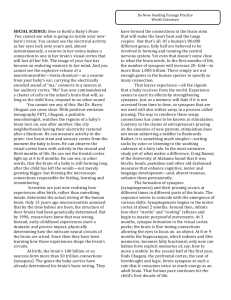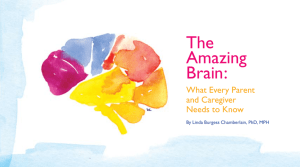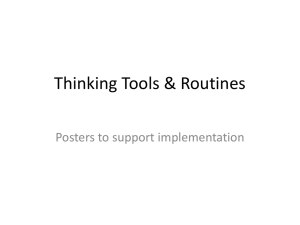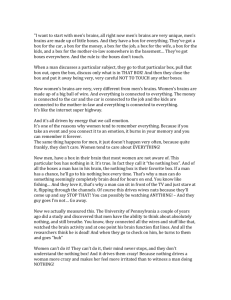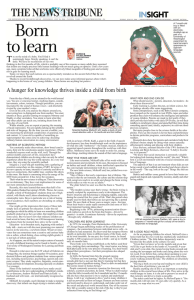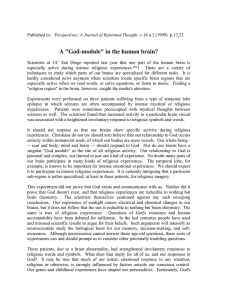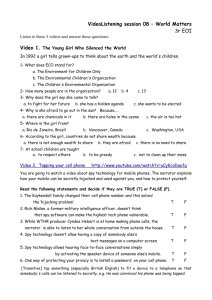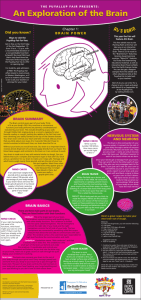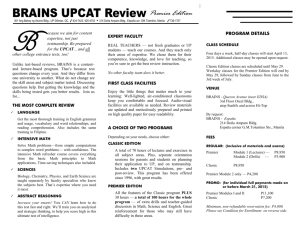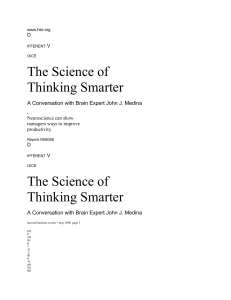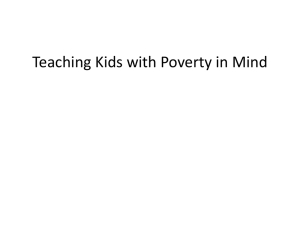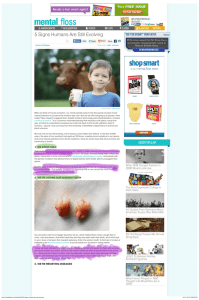Brain Development Quotes for Transition Book
advertisement
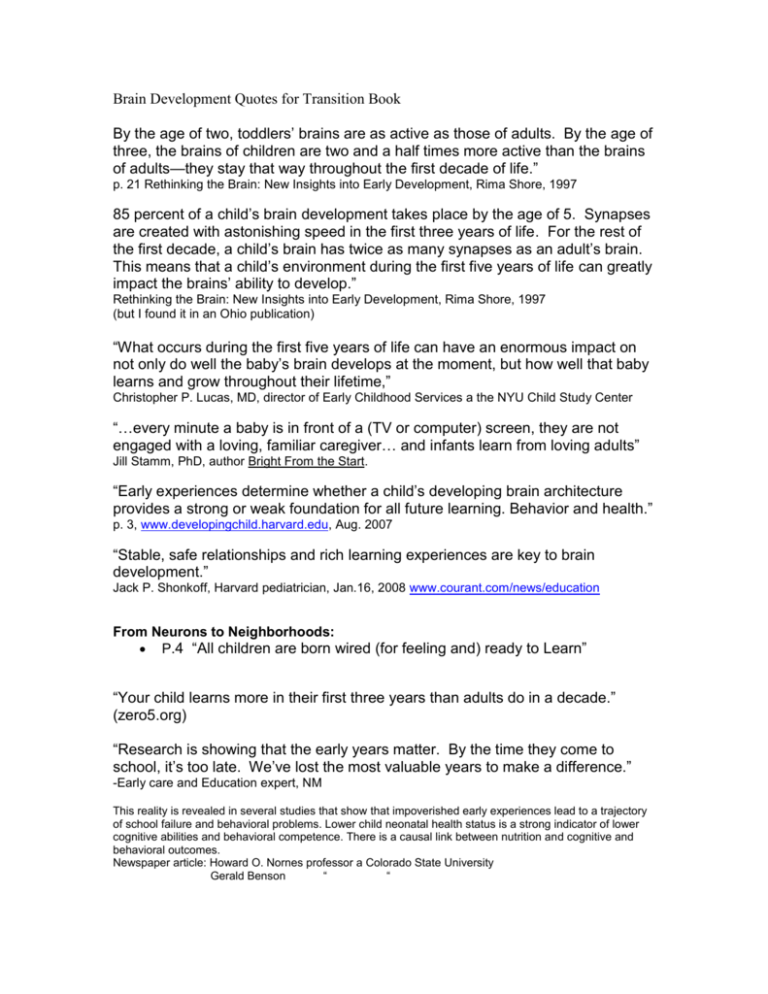
Brain Development Quotes for Transition Book By the age of two, toddlers’ brains are as active as those of adults. By the age of three, the brains of children are two and a half times more active than the brains of adults—they stay that way throughout the first decade of life.” p. 21 Rethinking the Brain: New Insights into Early Development, Rima Shore, 1997 85 percent of a child’s brain development takes place by the age of 5. Synapses are created with astonishing speed in the first three years of life. For the rest of the first decade, a child’s brain has twice as many synapses as an adult’s brain. This means that a child’s environment during the first five years of life can greatly impact the brains’ ability to develop.” Rethinking the Brain: New Insights into Early Development, Rima Shore, 1997 (but I found it in an Ohio publication) “What occurs during the first five years of life can have an enormous impact on not only do well the baby’s brain develops at the moment, but how well that baby learns and grow throughout their lifetime,” Christopher P. Lucas, MD, director of Early Childhood Services a the NYU Child Study Center “…every minute a baby is in front of a (TV or computer) screen, they are not engaged with a loving, familiar caregiver… and infants learn from loving adults” Jill Stamm, PhD, author Bright From the Start. “Early experiences determine whether a child’s developing brain architecture provides a strong or weak foundation for all future learning. Behavior and health.” p. 3, www.developingchild.harvard.edu, Aug. 2007 “Stable, safe relationships and rich learning experiences are key to brain development.” Jack P. Shonkoff, Harvard pediatrician, Jan.16, 2008 www.courant.com/news/education From Neurons to Neighborhoods: P.4 “All children are born wired (for feeling and) ready to Learn” “Your child learns more in their first three years than adults do in a decade.” (zero5.org) “Research is showing that the early years matter. By the time they come to school, it’s too late. We’ve lost the most valuable years to make a difference.” -Early care and Education expert, NM This reality is revealed in several studies that show that impoverished early experiences lead to a trajectory of school failure and behavioral problems. Lower child neonatal health status is a strong indicator of lower cognitive abilities and behavioral competence. There is a causal link between nutrition and cognitive and behavioral outcomes. Newspaper article: Howard O. Nornes professor a Colorado State University Gerald Benson “ “ From the Harvard Article: The Timing and Quality of Early Experiences Combine to Shape Brain Architecture, working paper 5 www.developingchild.net/pubs/wp/Timing_Quality_Early_Experiences.pdf “After birth, experience plays an increasingly important role in shaping the architecture (of developing neural circuits so that they function optimally for each individual)” of the brain. (p.2) “Reading a picture book with a toddler who is learning to speak, for example, provides an important opportunity to point to and talk about the pictures, not to focus on the written word. The ability to decode written language comes later.” (p.3) “When adults or communities expect young children to master skills for which the necessary brain circuits have not yet been formed, they waste time and resources, and may even impair healthy brain development (by inducing excessive stress in the child.” (p.4) “There are no credible scientific data to support the claim that specialized videos …have a positive, measurable impact on the developing brain….highly unlikely that the potential benefits of such media would even come close to matching the more important influences of attentive, nurturing, growth-promoting interactions with a vested adult.” (p.5) From: Final Report of the NGA Task Force on School Readiness “The education of America’s children begins the day they are born, not their first day in the classroom.” (Former Kentucky Gov. Paul E. Patton) “There is compelling research on early childhood development and that research clearly shows the importance of tapping into a child’s potential by beginning education in the first five years of life.” ((Former Missouri Gov. Bob Holden) “The importance of a strong family and caring parents in a child’s life can’t be overstated. Parent are a child’s first and most influential teachers.” (Idaho Gov. Dirk Kempthorne) “Children learn more from the birth to the age three than any other time in life. During these years, what we do will affect the way they learn, think and behave forever. As parents, child care providers and concerned citizens, it is our job to ensure that our youngest and most vulnerable residents are prepared and ready to enter the classroom.” (Michigan Gov. Jennifer Granholm) "Learning begins in the first days of life. Scientists are now discovering how young children develop emotionally and intellectually from their very first days, and how important it is for parents to begin immediately talking, singing, even reading to their infants....We already know we should start teaching children before they start school." (from a White House Conference in April 1997) Brain development is dependent upon both experience and genetics. Children are born with a range of IQ potential of approximately 40 points. Our goal as educators and parents is to help our children reach the maximum of this range in the first nine years of life. � Increased experiences define the wiring of an infant’s brain. In fact, by the age of three, 80% of the synaptic connections of brain cells - the “building blocks” of development - are already made. The relationships we foster with our children as we mediate their contact with environment directly impact’s the formation of these neural pathways. Have you wondered why there appear to be more children with ADD/ADHD? Perhaps it is because every hour spent with technology (TV and electronic games) increases the ADD/ADHD symptoms by 10%. As we speak with principals and admissions directors each year, the #1 issue they observe in young students is an inability to translate concrete concepts into abstract terms. 90% of what children experience should be through active play and direct, hands-on participation.



